ALDI: Management and Operations in Different Situational Contexts
VerifiedAdded on 2023/01/06
|12
|4027
|30
Report
AI Summary
This report provides an in-depth analysis of management and operations within ALDI, a popular discount supermarket chain. It examines the roles of leaders and managers in diverse situational contexts, including employee issues, financial problems, technological challenges, and team dynamics. The report evaluates various leadership and management theories, such as situational leadership, systems theory, contingency leadership, and chaos theory, assessing their strengths and weaknesses in the context of ALDI. Furthermore, it explores key approaches to operations management, including Six Sigma, lean production, queuing theory, total quality management, just-in-time inventory, and continuous improvement, highlighting the roles of leaders and managers in implementing these strategies. The report also emphasizes the importance of operations management in achieving business objectives and assesses the impact of factors within the business environment on operational management and decision-making. The report concludes with a comprehensive overview of the findings and recommendations for ALDI's continued success.
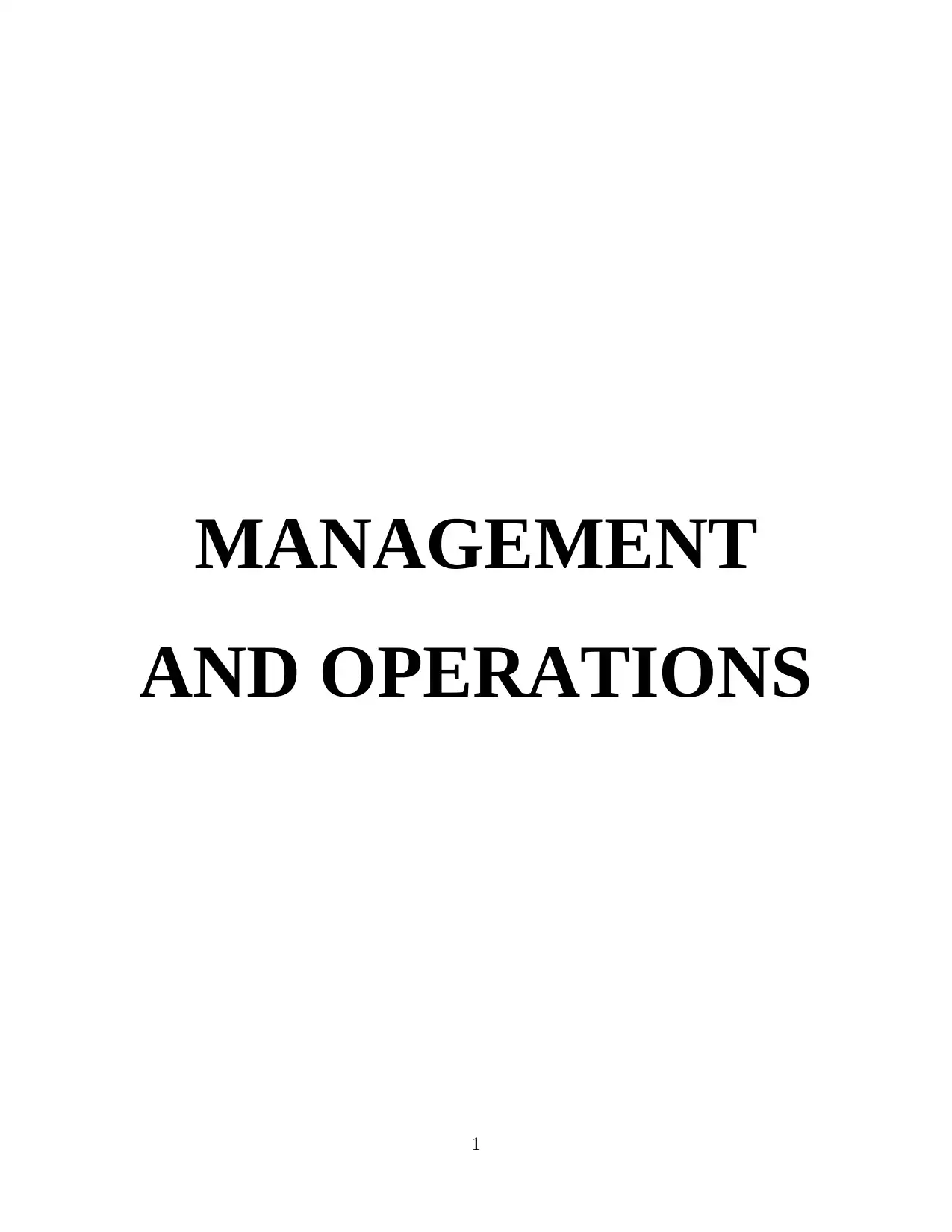
MANAGEMENT
AND OPERATIONS
1
AND OPERATIONS
1
Paraphrase This Document
Need a fresh take? Get an instant paraphrase of this document with our AI Paraphraser
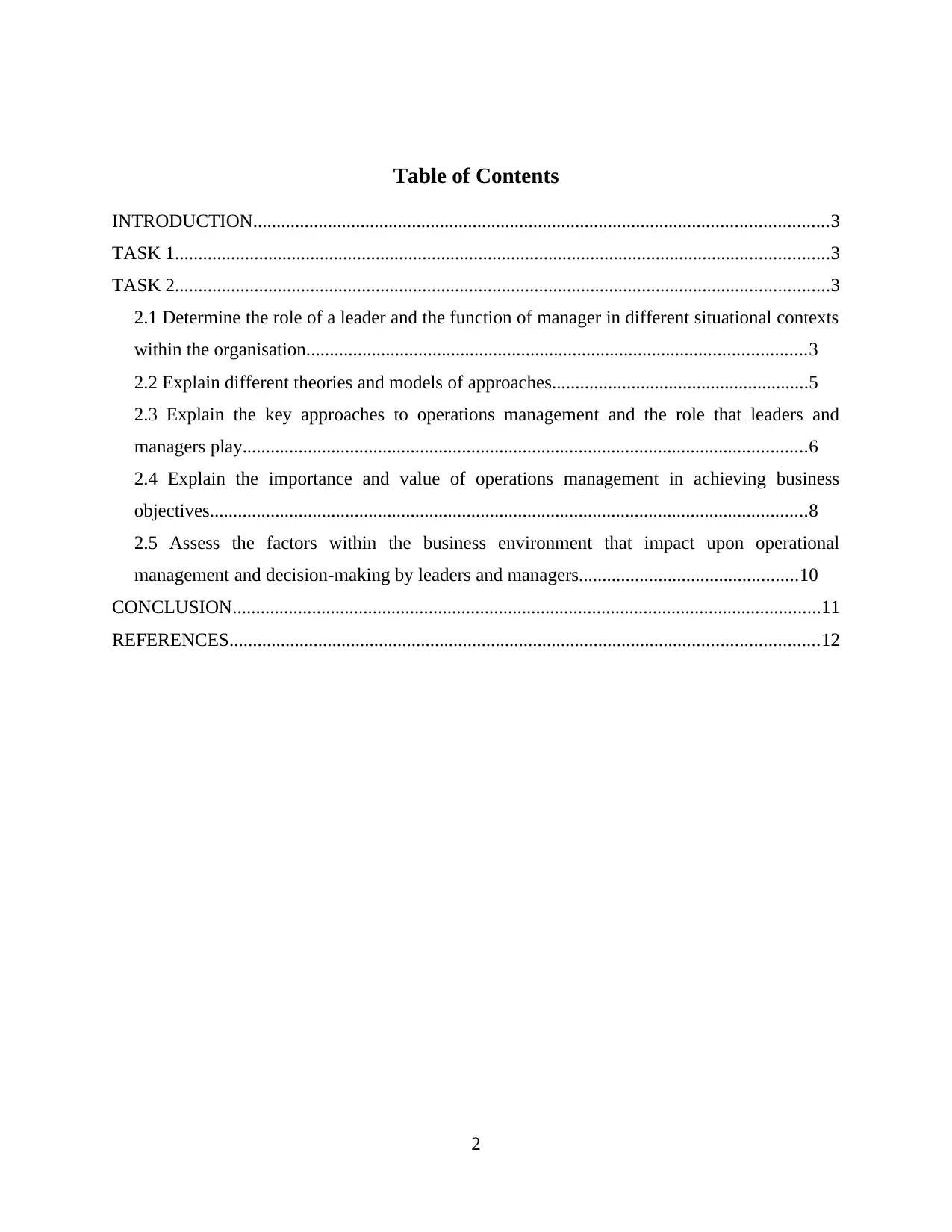
Table of Contents
INTRODUCTION...........................................................................................................................3
TASK 1............................................................................................................................................3
TASK 2............................................................................................................................................3
2.1 Determine the role of a leader and the function of manager in different situational contexts
within the organisation...........................................................................................................3
2.2 Explain different theories and models of approaches.......................................................5
2.3 Explain the key approaches to operations management and the role that leaders and
managers play.........................................................................................................................6
2.4 Explain the importance and value of operations management in achieving business
objectives................................................................................................................................8
2.5 Assess the factors within the business environment that impact upon operational
management and decision-making by leaders and managers...............................................10
CONCLUSION..............................................................................................................................11
REFERENCES..............................................................................................................................12
2
INTRODUCTION...........................................................................................................................3
TASK 1............................................................................................................................................3
TASK 2............................................................................................................................................3
2.1 Determine the role of a leader and the function of manager in different situational contexts
within the organisation...........................................................................................................3
2.2 Explain different theories and models of approaches.......................................................5
2.3 Explain the key approaches to operations management and the role that leaders and
managers play.........................................................................................................................6
2.4 Explain the importance and value of operations management in achieving business
objectives................................................................................................................................8
2.5 Assess the factors within the business environment that impact upon operational
management and decision-making by leaders and managers...............................................10
CONCLUSION..............................................................................................................................11
REFERENCES..............................................................................................................................12
2
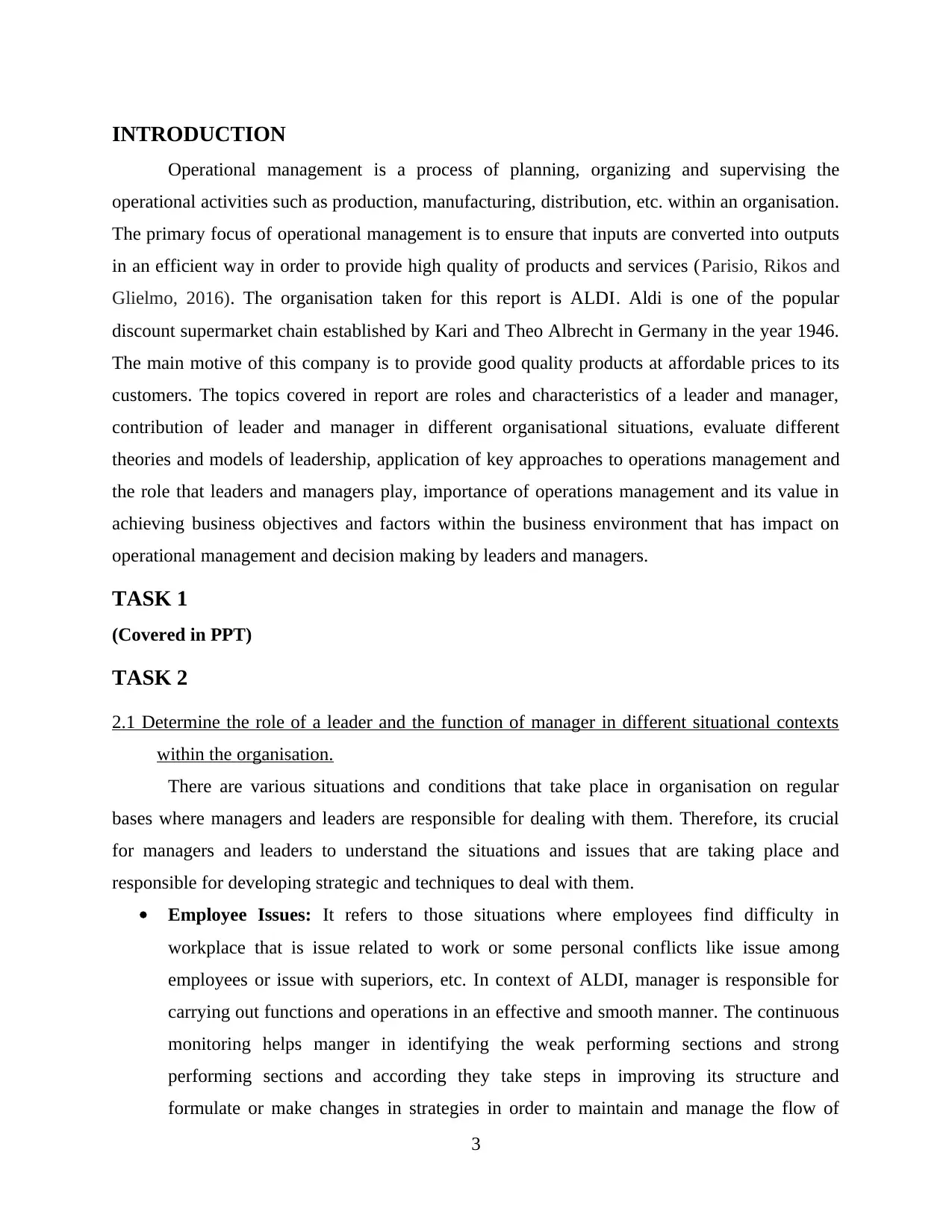
INTRODUCTION
Operational management is a process of planning, organizing and supervising the
operational activities such as production, manufacturing, distribution, etc. within an organisation.
The primary focus of operational management is to ensure that inputs are converted into outputs
in an efficient way in order to provide high quality of products and services (Parisio, Rikos and
Glielmo, 2016). The organisation taken for this report is ALDI. Aldi is one of the popular
discount supermarket chain established by Kari and Theo Albrecht in Germany in the year 1946.
The main motive of this company is to provide good quality products at affordable prices to its
customers. The topics covered in report are roles and characteristics of a leader and manager,
contribution of leader and manager in different organisational situations, evaluate different
theories and models of leadership, application of key approaches to operations management and
the role that leaders and managers play, importance of operations management and its value in
achieving business objectives and factors within the business environment that has impact on
operational management and decision making by leaders and managers.
TASK 1
(Covered in PPT)
TASK 2
2.1 Determine the role of a leader and the function of manager in different situational contexts
within the organisation.
There are various situations and conditions that take place in organisation on regular
bases where managers and leaders are responsible for dealing with them. Therefore, its crucial
for managers and leaders to understand the situations and issues that are taking place and
responsible for developing strategic and techniques to deal with them.
Employee Issues: It refers to those situations where employees find difficulty in
workplace that is issue related to work or some personal conflicts like issue among
employees or issue with superiors, etc. In context of ALDI, manager is responsible for
carrying out functions and operations in an effective and smooth manner. The continuous
monitoring helps manger in identifying the weak performing sections and strong
performing sections and according they take steps in improving its structure and
formulate or make changes in strategies in order to maintain and manage the flow of
3
Operational management is a process of planning, organizing and supervising the
operational activities such as production, manufacturing, distribution, etc. within an organisation.
The primary focus of operational management is to ensure that inputs are converted into outputs
in an efficient way in order to provide high quality of products and services (Parisio, Rikos and
Glielmo, 2016). The organisation taken for this report is ALDI. Aldi is one of the popular
discount supermarket chain established by Kari and Theo Albrecht in Germany in the year 1946.
The main motive of this company is to provide good quality products at affordable prices to its
customers. The topics covered in report are roles and characteristics of a leader and manager,
contribution of leader and manager in different organisational situations, evaluate different
theories and models of leadership, application of key approaches to operations management and
the role that leaders and managers play, importance of operations management and its value in
achieving business objectives and factors within the business environment that has impact on
operational management and decision making by leaders and managers.
TASK 1
(Covered in PPT)
TASK 2
2.1 Determine the role of a leader and the function of manager in different situational contexts
within the organisation.
There are various situations and conditions that take place in organisation on regular
bases where managers and leaders are responsible for dealing with them. Therefore, its crucial
for managers and leaders to understand the situations and issues that are taking place and
responsible for developing strategic and techniques to deal with them.
Employee Issues: It refers to those situations where employees find difficulty in
workplace that is issue related to work or some personal conflicts like issue among
employees or issue with superiors, etc. In context of ALDI, manager is responsible for
carrying out functions and operations in an effective and smooth manner. The continuous
monitoring helps manger in identifying the weak performing sections and strong
performing sections and according they take steps in improving its structure and
formulate or make changes in strategies in order to maintain and manage the flow of
3
⊘ This is a preview!⊘
Do you want full access?
Subscribe today to unlock all pages.

Trusted by 1+ million students worldwide
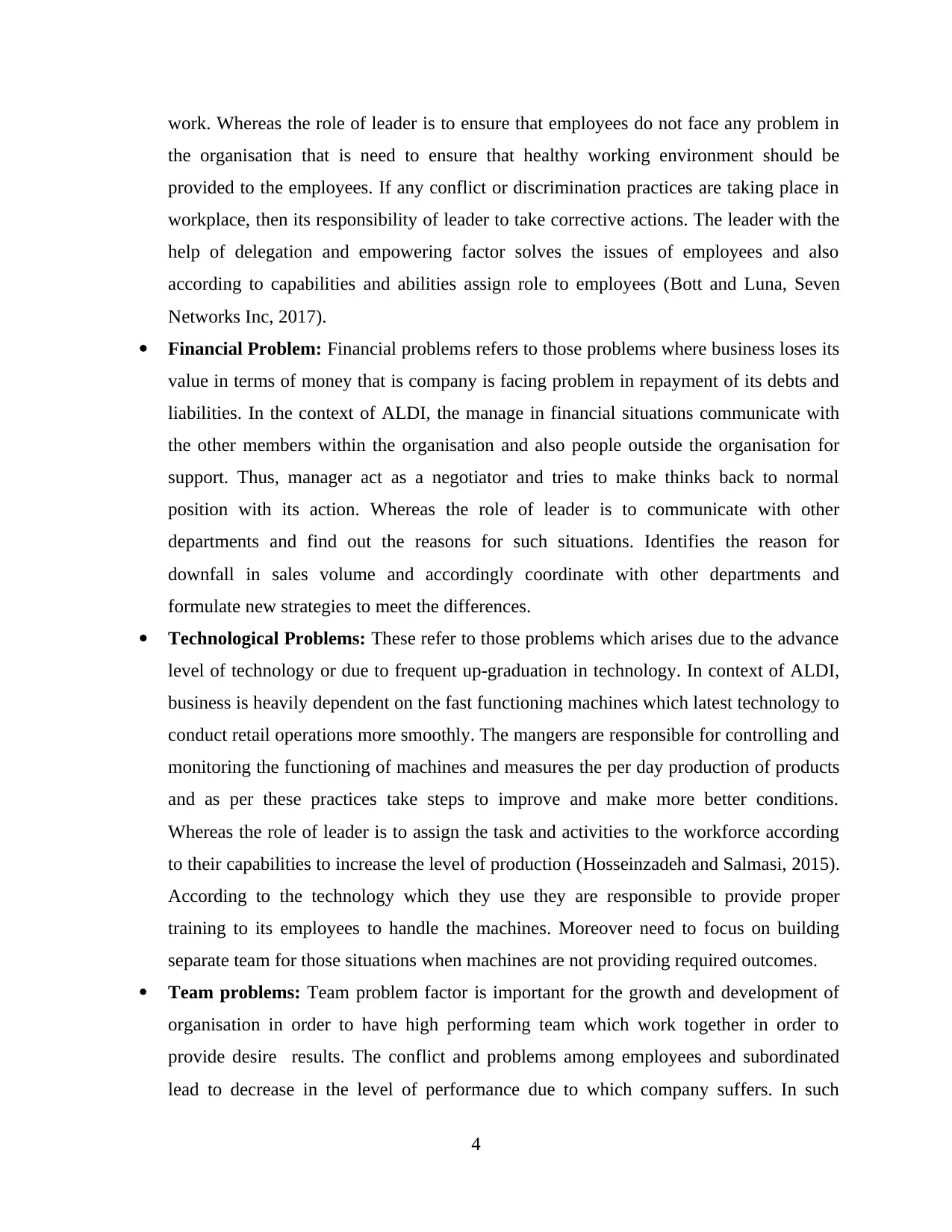
work. Whereas the role of leader is to ensure that employees do not face any problem in
the organisation that is need to ensure that healthy working environment should be
provided to the employees. If any conflict or discrimination practices are taking place in
workplace, then its responsibility of leader to take corrective actions. The leader with the
help of delegation and empowering factor solves the issues of employees and also
according to capabilities and abilities assign role to employees (Bott and Luna, Seven
Networks Inc, 2017).
Financial Problem: Financial problems refers to those problems where business loses its
value in terms of money that is company is facing problem in repayment of its debts and
liabilities. In the context of ALDI, the manage in financial situations communicate with
the other members within the organisation and also people outside the organisation for
support. Thus, manager act as a negotiator and tries to make thinks back to normal
position with its action. Whereas the role of leader is to communicate with other
departments and find out the reasons for such situations. Identifies the reason for
downfall in sales volume and accordingly coordinate with other departments and
formulate new strategies to meet the differences.
Technological Problems: These refer to those problems which arises due to the advance
level of technology or due to frequent up-graduation in technology. In context of ALDI,
business is heavily dependent on the fast functioning machines which latest technology to
conduct retail operations more smoothly. The mangers are responsible for controlling and
monitoring the functioning of machines and measures the per day production of products
and as per these practices take steps to improve and make more better conditions.
Whereas the role of leader is to assign the task and activities to the workforce according
to their capabilities to increase the level of production (Hosseinzadeh and Salmasi, 2015).
According to the technology which they use they are responsible to provide proper
training to its employees to handle the machines. Moreover need to focus on building
separate team for those situations when machines are not providing required outcomes.
Team problems: Team problem factor is important for the growth and development of
organisation in order to have high performing team which work together in order to
provide desire results. The conflict and problems among employees and subordinated
lead to decrease in the level of performance due to which company suffers. In such
4
the organisation that is need to ensure that healthy working environment should be
provided to the employees. If any conflict or discrimination practices are taking place in
workplace, then its responsibility of leader to take corrective actions. The leader with the
help of delegation and empowering factor solves the issues of employees and also
according to capabilities and abilities assign role to employees (Bott and Luna, Seven
Networks Inc, 2017).
Financial Problem: Financial problems refers to those problems where business loses its
value in terms of money that is company is facing problem in repayment of its debts and
liabilities. In the context of ALDI, the manage in financial situations communicate with
the other members within the organisation and also people outside the organisation for
support. Thus, manager act as a negotiator and tries to make thinks back to normal
position with its action. Whereas the role of leader is to communicate with other
departments and find out the reasons for such situations. Identifies the reason for
downfall in sales volume and accordingly coordinate with other departments and
formulate new strategies to meet the differences.
Technological Problems: These refer to those problems which arises due to the advance
level of technology or due to frequent up-graduation in technology. In context of ALDI,
business is heavily dependent on the fast functioning machines which latest technology to
conduct retail operations more smoothly. The mangers are responsible for controlling and
monitoring the functioning of machines and measures the per day production of products
and as per these practices take steps to improve and make more better conditions.
Whereas the role of leader is to assign the task and activities to the workforce according
to their capabilities to increase the level of production (Hosseinzadeh and Salmasi, 2015).
According to the technology which they use they are responsible to provide proper
training to its employees to handle the machines. Moreover need to focus on building
separate team for those situations when machines are not providing required outcomes.
Team problems: Team problem factor is important for the growth and development of
organisation in order to have high performing team which work together in order to
provide desire results. The conflict and problems among employees and subordinated
lead to decrease in the level of performance due to which company suffers. In such
4
Paraphrase This Document
Need a fresh take? Get an instant paraphrase of this document with our AI Paraphraser
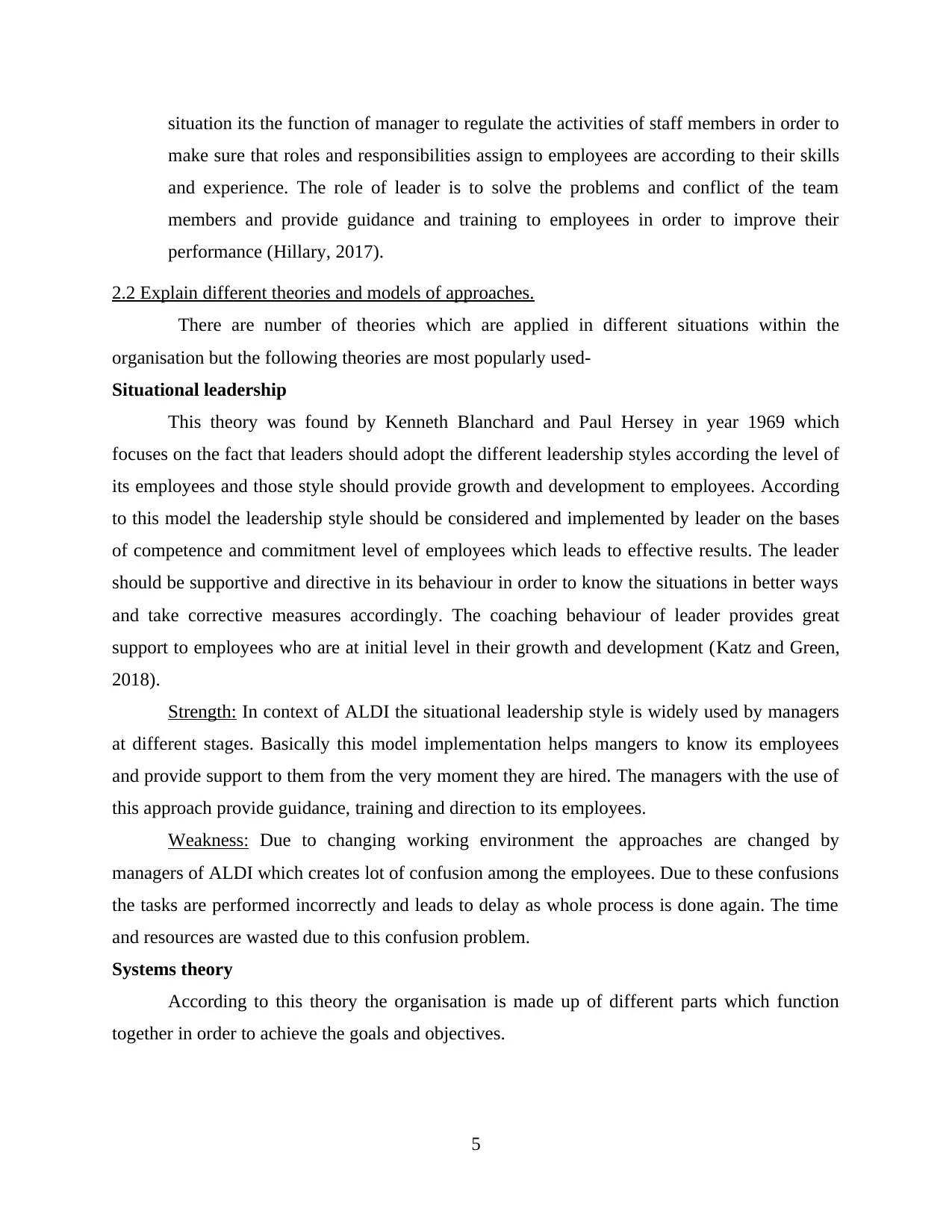
situation its the function of manager to regulate the activities of staff members in order to
make sure that roles and responsibilities assign to employees are according to their skills
and experience. The role of leader is to solve the problems and conflict of the team
members and provide guidance and training to employees in order to improve their
performance (Hillary, 2017).
2.2 Explain different theories and models of approaches.
There are number of theories which are applied in different situations within the
organisation but the following theories are most popularly used-
Situational leadership
This theory was found by Kenneth Blanchard and Paul Hersey in year 1969 which
focuses on the fact that leaders should adopt the different leadership styles according the level of
its employees and those style should provide growth and development to employees. According
to this model the leadership style should be considered and implemented by leader on the bases
of competence and commitment level of employees which leads to effective results. The leader
should be supportive and directive in its behaviour in order to know the situations in better ways
and take corrective measures accordingly. The coaching behaviour of leader provides great
support to employees who are at initial level in their growth and development (Katz and Green,
2018).
Strength: In context of ALDI the situational leadership style is widely used by managers
at different stages. Basically this model implementation helps mangers to know its employees
and provide support to them from the very moment they are hired. The managers with the use of
this approach provide guidance, training and direction to its employees.
Weakness: Due to changing working environment the approaches are changed by
managers of ALDI which creates lot of confusion among the employees. Due to these confusions
the tasks are performed incorrectly and leads to delay as whole process is done again. The time
and resources are wasted due to this confusion problem.
Systems theory
According to this theory the organisation is made up of different parts which function
together in order to achieve the goals and objectives.
5
make sure that roles and responsibilities assign to employees are according to their skills
and experience. The role of leader is to solve the problems and conflict of the team
members and provide guidance and training to employees in order to improve their
performance (Hillary, 2017).
2.2 Explain different theories and models of approaches.
There are number of theories which are applied in different situations within the
organisation but the following theories are most popularly used-
Situational leadership
This theory was found by Kenneth Blanchard and Paul Hersey in year 1969 which
focuses on the fact that leaders should adopt the different leadership styles according the level of
its employees and those style should provide growth and development to employees. According
to this model the leadership style should be considered and implemented by leader on the bases
of competence and commitment level of employees which leads to effective results. The leader
should be supportive and directive in its behaviour in order to know the situations in better ways
and take corrective measures accordingly. The coaching behaviour of leader provides great
support to employees who are at initial level in their growth and development (Katz and Green,
2018).
Strength: In context of ALDI the situational leadership style is widely used by managers
at different stages. Basically this model implementation helps mangers to know its employees
and provide support to them from the very moment they are hired. The managers with the use of
this approach provide guidance, training and direction to its employees.
Weakness: Due to changing working environment the approaches are changed by
managers of ALDI which creates lot of confusion among the employees. Due to these confusions
the tasks are performed incorrectly and leads to delay as whole process is done again. The time
and resources are wasted due to this confusion problem.
Systems theory
According to this theory the organisation is made up of different parts which function
together in order to achieve the goals and objectives.
5
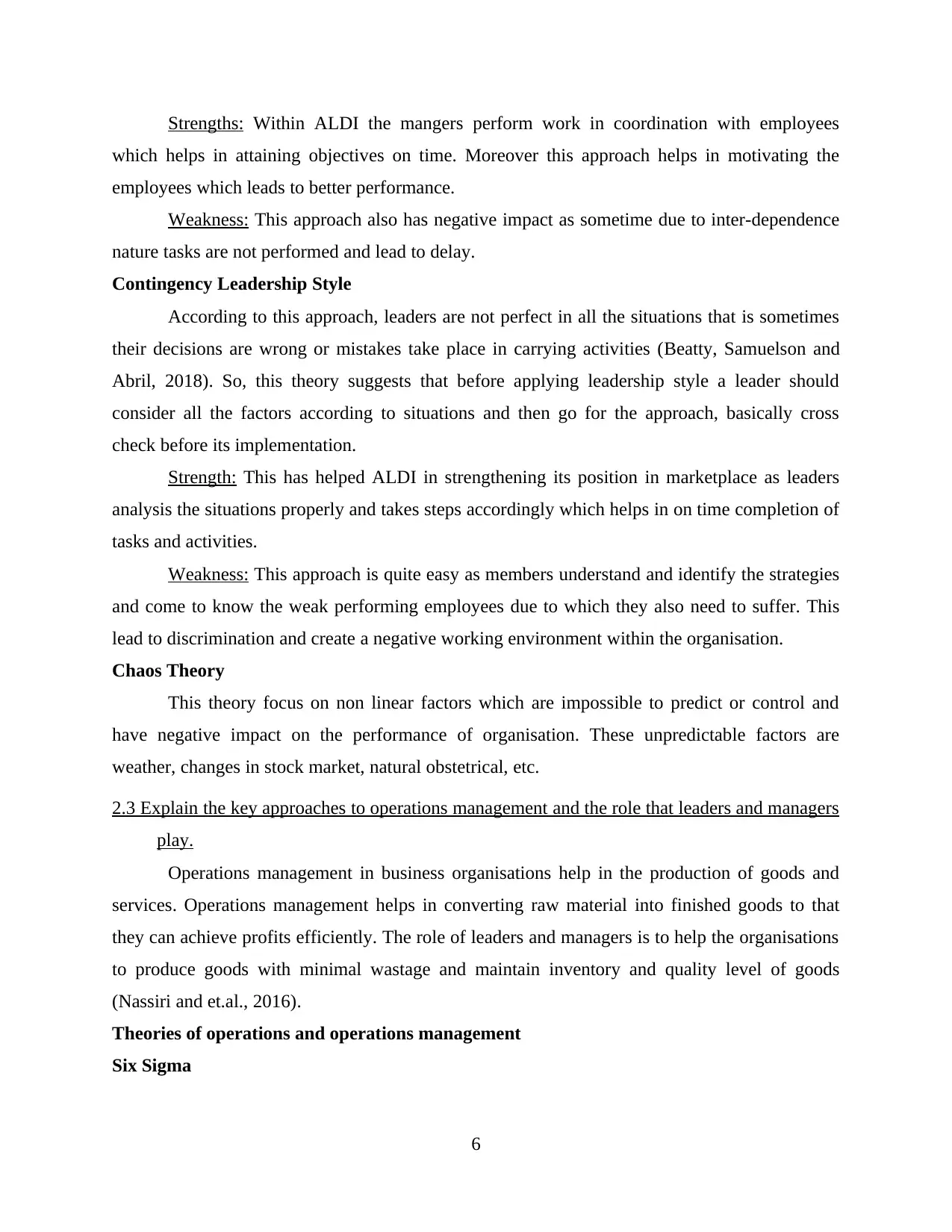
Strengths: Within ALDI the mangers perform work in coordination with employees
which helps in attaining objectives on time. Moreover this approach helps in motivating the
employees which leads to better performance.
Weakness: This approach also has negative impact as sometime due to inter-dependence
nature tasks are not performed and lead to delay.
Contingency Leadership Style
According to this approach, leaders are not perfect in all the situations that is sometimes
their decisions are wrong or mistakes take place in carrying activities (Beatty, Samuelson and
Abril, 2018). So, this theory suggests that before applying leadership style a leader should
consider all the factors according to situations and then go for the approach, basically cross
check before its implementation.
Strength: This has helped ALDI in strengthening its position in marketplace as leaders
analysis the situations properly and takes steps accordingly which helps in on time completion of
tasks and activities.
Weakness: This approach is quite easy as members understand and identify the strategies
and come to know the weak performing employees due to which they also need to suffer. This
lead to discrimination and create a negative working environment within the organisation.
Chaos Theory
This theory focus on non linear factors which are impossible to predict or control and
have negative impact on the performance of organisation. These unpredictable factors are
weather, changes in stock market, natural obstetrical, etc.
2.3 Explain the key approaches to operations management and the role that leaders and managers
play.
Operations management in business organisations help in the production of goods and
services. Operations management helps in converting raw material into finished goods to that
they can achieve profits efficiently. The role of leaders and managers is to help the organisations
to produce goods with minimal wastage and maintain inventory and quality level of goods
(Nassiri and et.al., 2016).
Theories of operations and operations management
Six Sigma
6
which helps in attaining objectives on time. Moreover this approach helps in motivating the
employees which leads to better performance.
Weakness: This approach also has negative impact as sometime due to inter-dependence
nature tasks are not performed and lead to delay.
Contingency Leadership Style
According to this approach, leaders are not perfect in all the situations that is sometimes
their decisions are wrong or mistakes take place in carrying activities (Beatty, Samuelson and
Abril, 2018). So, this theory suggests that before applying leadership style a leader should
consider all the factors according to situations and then go for the approach, basically cross
check before its implementation.
Strength: This has helped ALDI in strengthening its position in marketplace as leaders
analysis the situations properly and takes steps accordingly which helps in on time completion of
tasks and activities.
Weakness: This approach is quite easy as members understand and identify the strategies
and come to know the weak performing employees due to which they also need to suffer. This
lead to discrimination and create a negative working environment within the organisation.
Chaos Theory
This theory focus on non linear factors which are impossible to predict or control and
have negative impact on the performance of organisation. These unpredictable factors are
weather, changes in stock market, natural obstetrical, etc.
2.3 Explain the key approaches to operations management and the role that leaders and managers
play.
Operations management in business organisations help in the production of goods and
services. Operations management helps in converting raw material into finished goods to that
they can achieve profits efficiently. The role of leaders and managers is to help the organisations
to produce goods with minimal wastage and maintain inventory and quality level of goods
(Nassiri and et.al., 2016).
Theories of operations and operations management
Six Sigma
6
⊘ This is a preview!⊘
Do you want full access?
Subscribe today to unlock all pages.

Trusted by 1+ million students worldwide
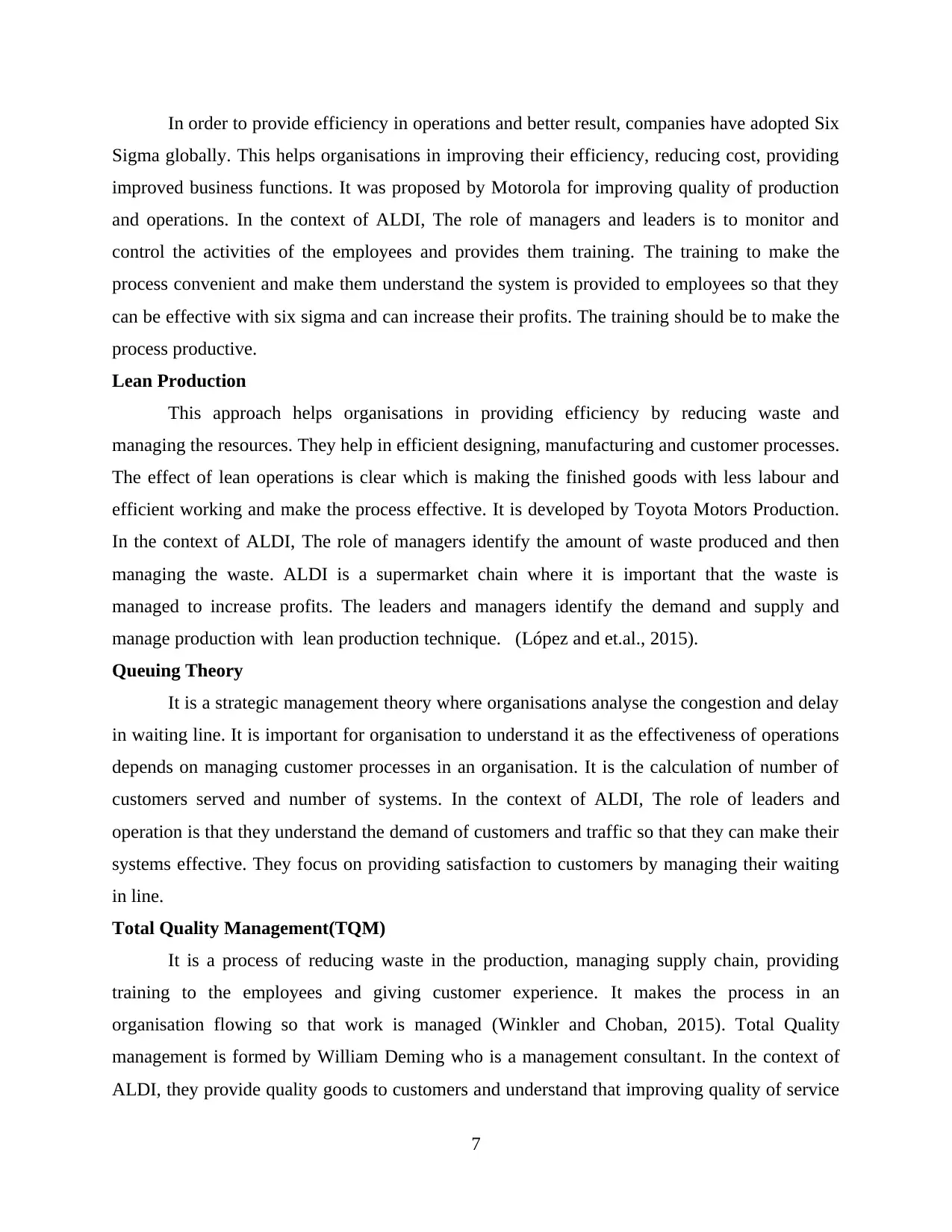
In order to provide efficiency in operations and better result, companies have adopted Six
Sigma globally. This helps organisations in improving their efficiency, reducing cost, providing
improved business functions. It was proposed by Motorola for improving quality of production
and operations. In the context of ALDI, The role of managers and leaders is to monitor and
control the activities of the employees and provides them training. The training to make the
process convenient and make them understand the system is provided to employees so that they
can be effective with six sigma and can increase their profits. The training should be to make the
process productive.
Lean Production
This approach helps organisations in providing efficiency by reducing waste and
managing the resources. They help in efficient designing, manufacturing and customer processes.
The effect of lean operations is clear which is making the finished goods with less labour and
efficient working and make the process effective. It is developed by Toyota Motors Production.
In the context of ALDI, The role of managers identify the amount of waste produced and then
managing the waste. ALDI is a supermarket chain where it is important that the waste is
managed to increase profits. The leaders and managers identify the demand and supply and
manage production with lean production technique. (López and et.al., 2015).
Queuing Theory
It is a strategic management theory where organisations analyse the congestion and delay
in waiting line. It is important for organisation to understand it as the effectiveness of operations
depends on managing customer processes in an organisation. It is the calculation of number of
customers served and number of systems. In the context of ALDI, The role of leaders and
operation is that they understand the demand of customers and traffic so that they can make their
systems effective. They focus on providing satisfaction to customers by managing their waiting
in line.
Total Quality Management(TQM)
It is a process of reducing waste in the production, managing supply chain, providing
training to the employees and giving customer experience. It makes the process in an
organisation flowing so that work is managed (Winkler and Choban, 2015). Total Quality
management is formed by William Deming who is a management consultant. In the context of
ALDI, they provide quality goods to customers and understand that improving quality of service
7
Sigma globally. This helps organisations in improving their efficiency, reducing cost, providing
improved business functions. It was proposed by Motorola for improving quality of production
and operations. In the context of ALDI, The role of managers and leaders is to monitor and
control the activities of the employees and provides them training. The training to make the
process convenient and make them understand the system is provided to employees so that they
can be effective with six sigma and can increase their profits. The training should be to make the
process productive.
Lean Production
This approach helps organisations in providing efficiency by reducing waste and
managing the resources. They help in efficient designing, manufacturing and customer processes.
The effect of lean operations is clear which is making the finished goods with less labour and
efficient working and make the process effective. It is developed by Toyota Motors Production.
In the context of ALDI, The role of managers identify the amount of waste produced and then
managing the waste. ALDI is a supermarket chain where it is important that the waste is
managed to increase profits. The leaders and managers identify the demand and supply and
manage production with lean production technique. (López and et.al., 2015).
Queuing Theory
It is a strategic management theory where organisations analyse the congestion and delay
in waiting line. It is important for organisation to understand it as the effectiveness of operations
depends on managing customer processes in an organisation. It is the calculation of number of
customers served and number of systems. In the context of ALDI, The role of leaders and
operation is that they understand the demand of customers and traffic so that they can make their
systems effective. They focus on providing satisfaction to customers by managing their waiting
in line.
Total Quality Management(TQM)
It is a process of reducing waste in the production, managing supply chain, providing
training to the employees and giving customer experience. It makes the process in an
organisation flowing so that work is managed (Winkler and Choban, 2015). Total Quality
management is formed by William Deming who is a management consultant. In the context of
ALDI, they provide quality goods to customers and understand that improving quality of service
7
Paraphrase This Document
Need a fresh take? Get an instant paraphrase of this document with our AI Paraphraser
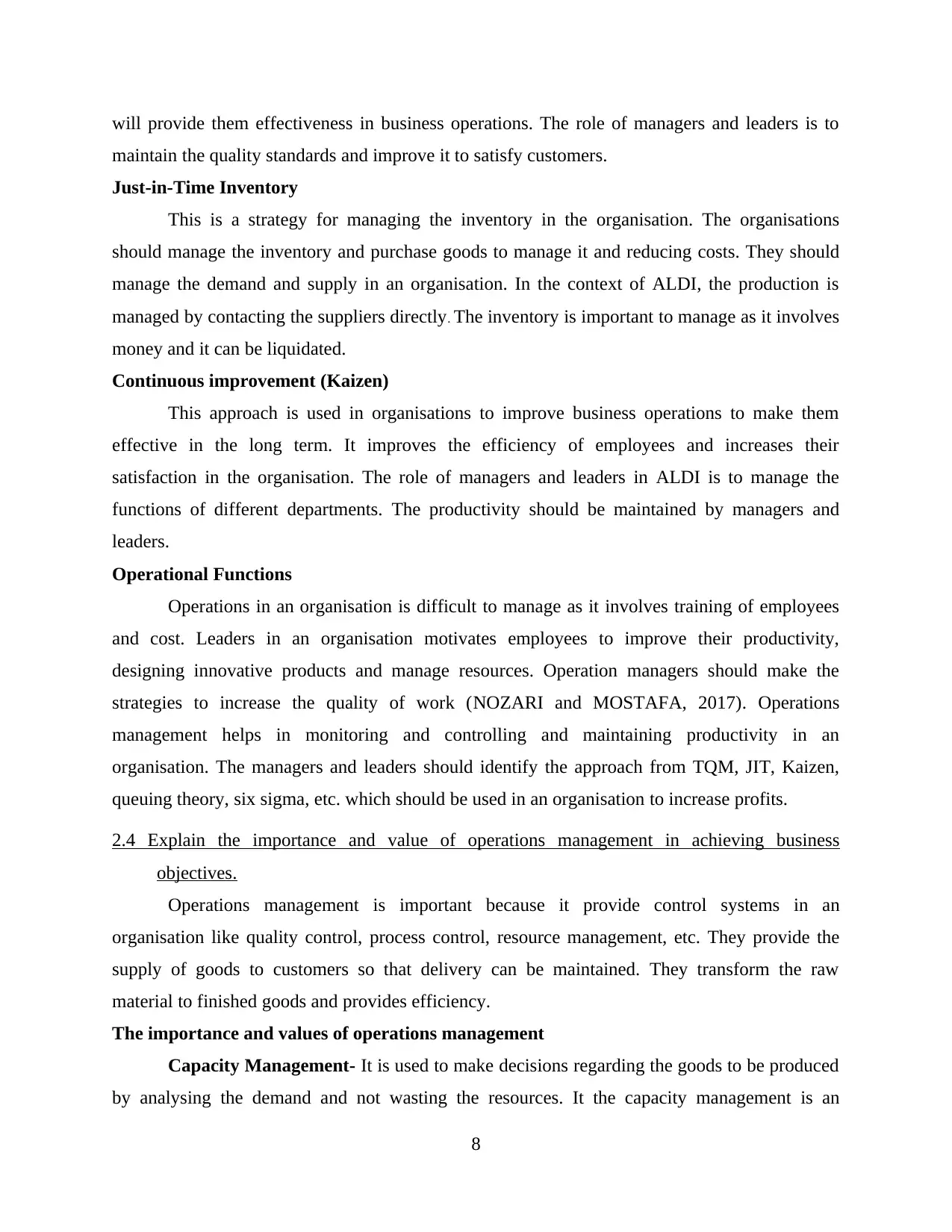
will provide them effectiveness in business operations. The role of managers and leaders is to
maintain the quality standards and improve it to satisfy customers.
Just-in-Time Inventory
This is a strategy for managing the inventory in the organisation. The organisations
should manage the inventory and purchase goods to manage it and reducing costs. They should
manage the demand and supply in an organisation. In the context of ALDI, the production is
managed by contacting the suppliers directly. The inventory is important to manage as it involves
money and it can be liquidated.
Continuous improvement (Kaizen)
This approach is used in organisations to improve business operations to make them
effective in the long term. It improves the efficiency of employees and increases their
satisfaction in the organisation. The role of managers and leaders in ALDI is to manage the
functions of different departments. The productivity should be maintained by managers and
leaders.
Operational Functions
Operations in an organisation is difficult to manage as it involves training of employees
and cost. Leaders in an organisation motivates employees to improve their productivity,
designing innovative products and manage resources. Operation managers should make the
strategies to increase the quality of work (NOZARI and MOSTAFA, 2017). Operations
management helps in monitoring and controlling and maintaining productivity in an
organisation. The managers and leaders should identify the approach from TQM, JIT, Kaizen,
queuing theory, six sigma, etc. which should be used in an organisation to increase profits.
2.4 Explain the importance and value of operations management in achieving business
objectives.
Operations management is important because it provide control systems in an
organisation like quality control, process control, resource management, etc. They provide the
supply of goods to customers so that delivery can be maintained. They transform the raw
material to finished goods and provides efficiency.
The importance and values of operations management
Capacity Management- It is used to make decisions regarding the goods to be produced
by analysing the demand and not wasting the resources. It the capacity management is an
8
maintain the quality standards and improve it to satisfy customers.
Just-in-Time Inventory
This is a strategy for managing the inventory in the organisation. The organisations
should manage the inventory and purchase goods to manage it and reducing costs. They should
manage the demand and supply in an organisation. In the context of ALDI, the production is
managed by contacting the suppliers directly. The inventory is important to manage as it involves
money and it can be liquidated.
Continuous improvement (Kaizen)
This approach is used in organisations to improve business operations to make them
effective in the long term. It improves the efficiency of employees and increases their
satisfaction in the organisation. The role of managers and leaders in ALDI is to manage the
functions of different departments. The productivity should be maintained by managers and
leaders.
Operational Functions
Operations in an organisation is difficult to manage as it involves training of employees
and cost. Leaders in an organisation motivates employees to improve their productivity,
designing innovative products and manage resources. Operation managers should make the
strategies to increase the quality of work (NOZARI and MOSTAFA, 2017). Operations
management helps in monitoring and controlling and maintaining productivity in an
organisation. The managers and leaders should identify the approach from TQM, JIT, Kaizen,
queuing theory, six sigma, etc. which should be used in an organisation to increase profits.
2.4 Explain the importance and value of operations management in achieving business
objectives.
Operations management is important because it provide control systems in an
organisation like quality control, process control, resource management, etc. They provide the
supply of goods to customers so that delivery can be maintained. They transform the raw
material to finished goods and provides efficiency.
The importance and values of operations management
Capacity Management- It is used to make decisions regarding the goods to be produced
by analysing the demand and not wasting the resources. It the capacity management is an
8
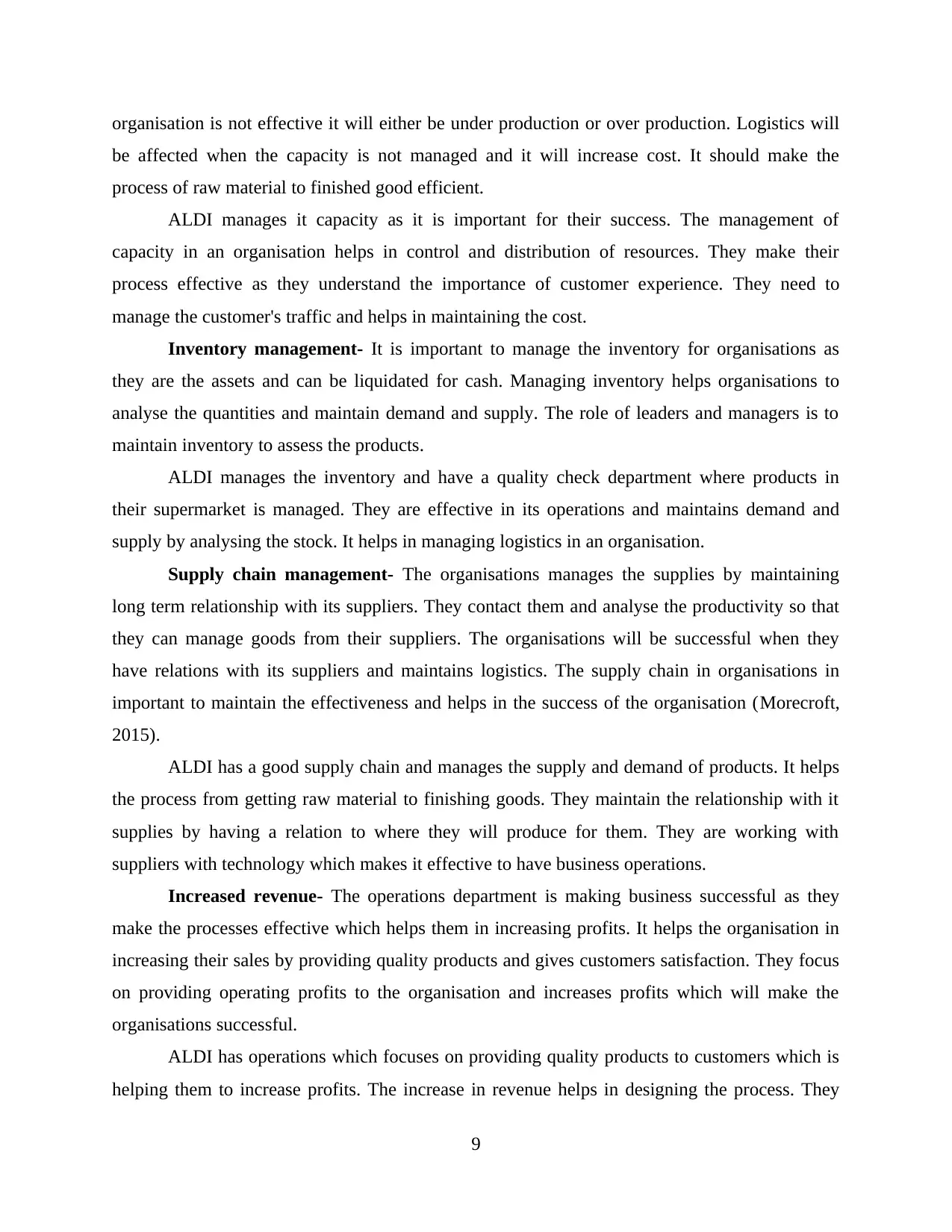
organisation is not effective it will either be under production or over production. Logistics will
be affected when the capacity is not managed and it will increase cost. It should make the
process of raw material to finished good efficient.
ALDI manages it capacity as it is important for their success. The management of
capacity in an organisation helps in control and distribution of resources. They make their
process effective as they understand the importance of customer experience. They need to
manage the customer's traffic and helps in maintaining the cost.
Inventory management- It is important to manage the inventory for organisations as
they are the assets and can be liquidated for cash. Managing inventory helps organisations to
analyse the quantities and maintain demand and supply. The role of leaders and managers is to
maintain inventory to assess the products.
ALDI manages the inventory and have a quality check department where products in
their supermarket is managed. They are effective in its operations and maintains demand and
supply by analysing the stock. It helps in managing logistics in an organisation.
Supply chain management- The organisations manages the supplies by maintaining
long term relationship with its suppliers. They contact them and analyse the productivity so that
they can manage goods from their suppliers. The organisations will be successful when they
have relations with its suppliers and maintains logistics. The supply chain in organisations in
important to maintain the effectiveness and helps in the success of the organisation (Morecroft,
2015).
ALDI has a good supply chain and manages the supply and demand of products. It helps
the process from getting raw material to finishing goods. They maintain the relationship with it
supplies by having a relation to where they will produce for them. They are working with
suppliers with technology which makes it effective to have business operations.
Increased revenue- The operations department is making business successful as they
make the processes effective which helps them in increasing profits. It helps the organisation in
increasing their sales by providing quality products and gives customers satisfaction. They focus
on providing operating profits to the organisation and increases profits which will make the
organisations successful.
ALDI has operations which focuses on providing quality products to customers which is
helping them to increase profits. The increase in revenue helps in designing the process. They
9
be affected when the capacity is not managed and it will increase cost. It should make the
process of raw material to finished good efficient.
ALDI manages it capacity as it is important for their success. The management of
capacity in an organisation helps in control and distribution of resources. They make their
process effective as they understand the importance of customer experience. They need to
manage the customer's traffic and helps in maintaining the cost.
Inventory management- It is important to manage the inventory for organisations as
they are the assets and can be liquidated for cash. Managing inventory helps organisations to
analyse the quantities and maintain demand and supply. The role of leaders and managers is to
maintain inventory to assess the products.
ALDI manages the inventory and have a quality check department where products in
their supermarket is managed. They are effective in its operations and maintains demand and
supply by analysing the stock. It helps in managing logistics in an organisation.
Supply chain management- The organisations manages the supplies by maintaining
long term relationship with its suppliers. They contact them and analyse the productivity so that
they can manage goods from their suppliers. The organisations will be successful when they
have relations with its suppliers and maintains logistics. The supply chain in organisations in
important to maintain the effectiveness and helps in the success of the organisation (Morecroft,
2015).
ALDI has a good supply chain and manages the supply and demand of products. It helps
the process from getting raw material to finishing goods. They maintain the relationship with it
supplies by having a relation to where they will produce for them. They are working with
suppliers with technology which makes it effective to have business operations.
Increased revenue- The operations department is making business successful as they
make the processes effective which helps them in increasing profits. It helps the organisation in
increasing their sales by providing quality products and gives customers satisfaction. They focus
on providing operating profits to the organisation and increases profits which will make the
organisations successful.
ALDI has operations which focuses on providing quality products to customers which is
helping them to increase profits. The increase in revenue helps in designing the process. They
9
⊘ This is a preview!⊘
Do you want full access?
Subscribe today to unlock all pages.

Trusted by 1+ million students worldwide
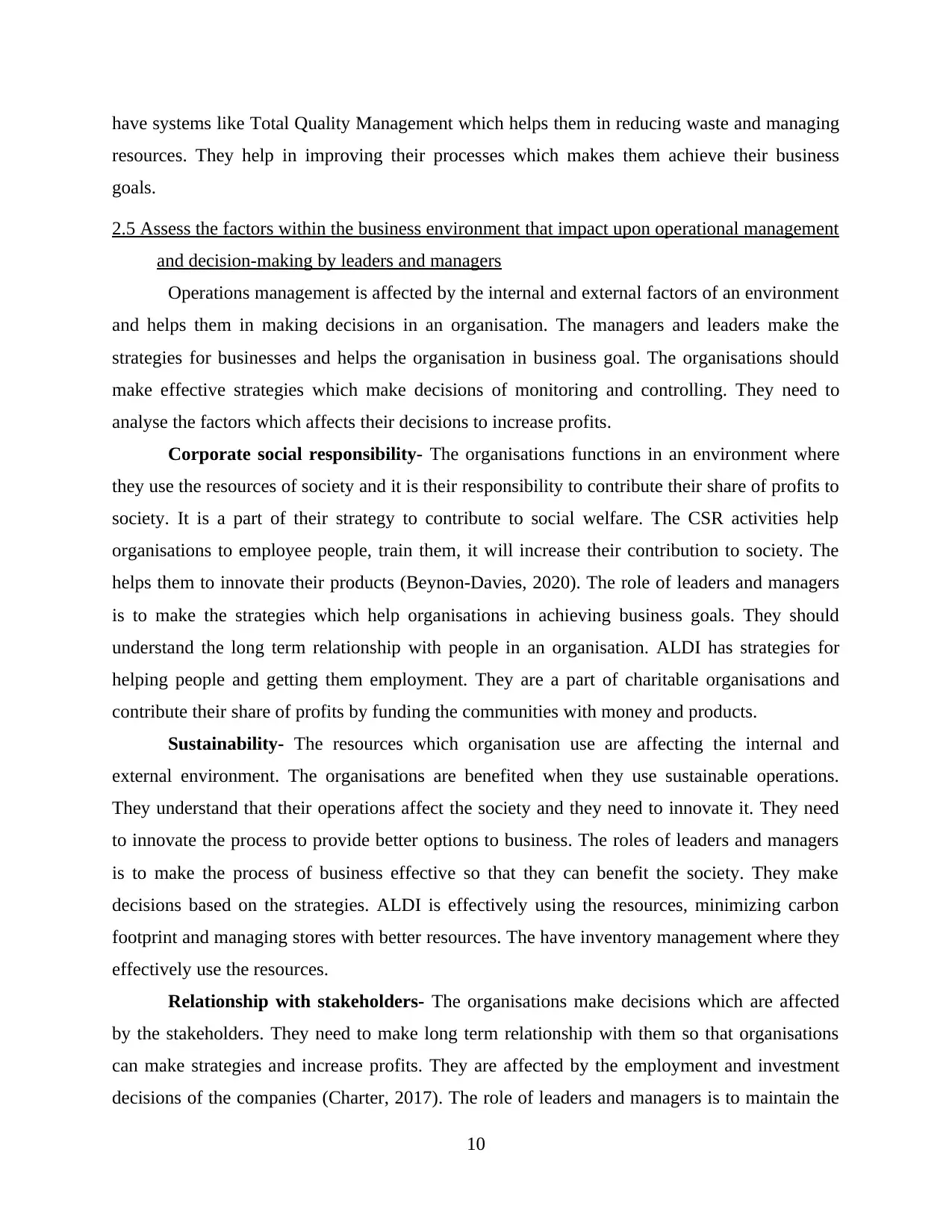
have systems like Total Quality Management which helps them in reducing waste and managing
resources. They help in improving their processes which makes them achieve their business
goals.
2.5 Assess the factors within the business environment that impact upon operational management
and decision-making by leaders and managers
Operations management is affected by the internal and external factors of an environment
and helps them in making decisions in an organisation. The managers and leaders make the
strategies for businesses and helps the organisation in business goal. The organisations should
make effective strategies which make decisions of monitoring and controlling. They need to
analyse the factors which affects their decisions to increase profits.
Corporate social responsibility- The organisations functions in an environment where
they use the resources of society and it is their responsibility to contribute their share of profits to
society. It is a part of their strategy to contribute to social welfare. The CSR activities help
organisations to employee people, train them, it will increase their contribution to society. The
helps them to innovate their products (Beynon-Davies, 2020). The role of leaders and managers
is to make the strategies which help organisations in achieving business goals. They should
understand the long term relationship with people in an organisation. ALDI has strategies for
helping people and getting them employment. They are a part of charitable organisations and
contribute their share of profits by funding the communities with money and products.
Sustainability- The resources which organisation use are affecting the internal and
external environment. The organisations are benefited when they use sustainable operations.
They understand that their operations affect the society and they need to innovate it. They need
to innovate the process to provide better options to business. The roles of leaders and managers
is to make the process of business effective so that they can benefit the society. They make
decisions based on the strategies. ALDI is effectively using the resources, minimizing carbon
footprint and managing stores with better resources. The have inventory management where they
effectively use the resources.
Relationship with stakeholders- The organisations make decisions which are affected
by the stakeholders. They need to make long term relationship with them so that organisations
can make strategies and increase profits. They are affected by the employment and investment
decisions of the companies (Charter, 2017). The role of leaders and managers is to maintain the
10
resources. They help in improving their processes which makes them achieve their business
goals.
2.5 Assess the factors within the business environment that impact upon operational management
and decision-making by leaders and managers
Operations management is affected by the internal and external factors of an environment
and helps them in making decisions in an organisation. The managers and leaders make the
strategies for businesses and helps the organisation in business goal. The organisations should
make effective strategies which make decisions of monitoring and controlling. They need to
analyse the factors which affects their decisions to increase profits.
Corporate social responsibility- The organisations functions in an environment where
they use the resources of society and it is their responsibility to contribute their share of profits to
society. It is a part of their strategy to contribute to social welfare. The CSR activities help
organisations to employee people, train them, it will increase their contribution to society. The
helps them to innovate their products (Beynon-Davies, 2020). The role of leaders and managers
is to make the strategies which help organisations in achieving business goals. They should
understand the long term relationship with people in an organisation. ALDI has strategies for
helping people and getting them employment. They are a part of charitable organisations and
contribute their share of profits by funding the communities with money and products.
Sustainability- The resources which organisation use are affecting the internal and
external environment. The organisations are benefited when they use sustainable operations.
They understand that their operations affect the society and they need to innovate it. They need
to innovate the process to provide better options to business. The roles of leaders and managers
is to make the process of business effective so that they can benefit the society. They make
decisions based on the strategies. ALDI is effectively using the resources, minimizing carbon
footprint and managing stores with better resources. The have inventory management where they
effectively use the resources.
Relationship with stakeholders- The organisations make decisions which are affected
by the stakeholders. They need to make long term relationship with them so that organisations
can make strategies and increase profits. They are affected by the employment and investment
decisions of the companies (Charter, 2017). The role of leaders and managers is to maintain the
10
Paraphrase This Document
Need a fresh take? Get an instant paraphrase of this document with our AI Paraphraser
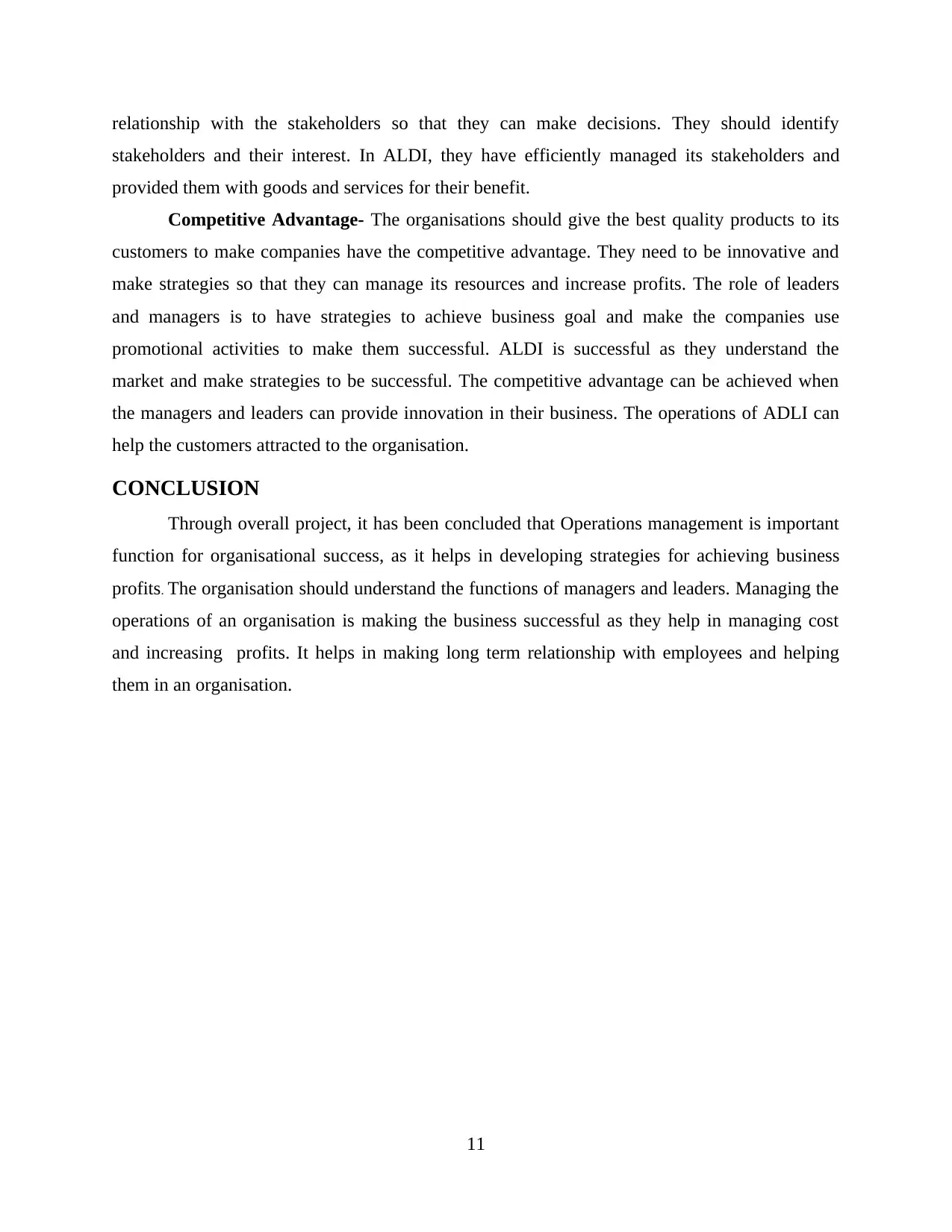
relationship with the stakeholders so that they can make decisions. They should identify
stakeholders and their interest. In ALDI, they have efficiently managed its stakeholders and
provided them with goods and services for their benefit.
Competitive Advantage- The organisations should give the best quality products to its
customers to make companies have the competitive advantage. They need to be innovative and
make strategies so that they can manage its resources and increase profits. The role of leaders
and managers is to have strategies to achieve business goal and make the companies use
promotional activities to make them successful. ALDI is successful as they understand the
market and make strategies to be successful. The competitive advantage can be achieved when
the managers and leaders can provide innovation in their business. The operations of ADLI can
help the customers attracted to the organisation.
CONCLUSION
Through overall project, it has been concluded that Operations management is important
function for organisational success, as it helps in developing strategies for achieving business
profits. The organisation should understand the functions of managers and leaders. Managing the
operations of an organisation is making the business successful as they help in managing cost
and increasing profits. It helps in making long term relationship with employees and helping
them in an organisation.
11
stakeholders and their interest. In ALDI, they have efficiently managed its stakeholders and
provided them with goods and services for their benefit.
Competitive Advantage- The organisations should give the best quality products to its
customers to make companies have the competitive advantage. They need to be innovative and
make strategies so that they can manage its resources and increase profits. The role of leaders
and managers is to have strategies to achieve business goal and make the companies use
promotional activities to make them successful. ALDI is successful as they understand the
market and make strategies to be successful. The competitive advantage can be achieved when
the managers and leaders can provide innovation in their business. The operations of ADLI can
help the customers attracted to the organisation.
CONCLUSION
Through overall project, it has been concluded that Operations management is important
function for organisational success, as it helps in developing strategies for achieving business
profits. The organisation should understand the functions of managers and leaders. Managing the
operations of an organisation is making the business successful as they help in managing cost
and increasing profits. It helps in making long term relationship with employees and helping
them in an organisation.
11
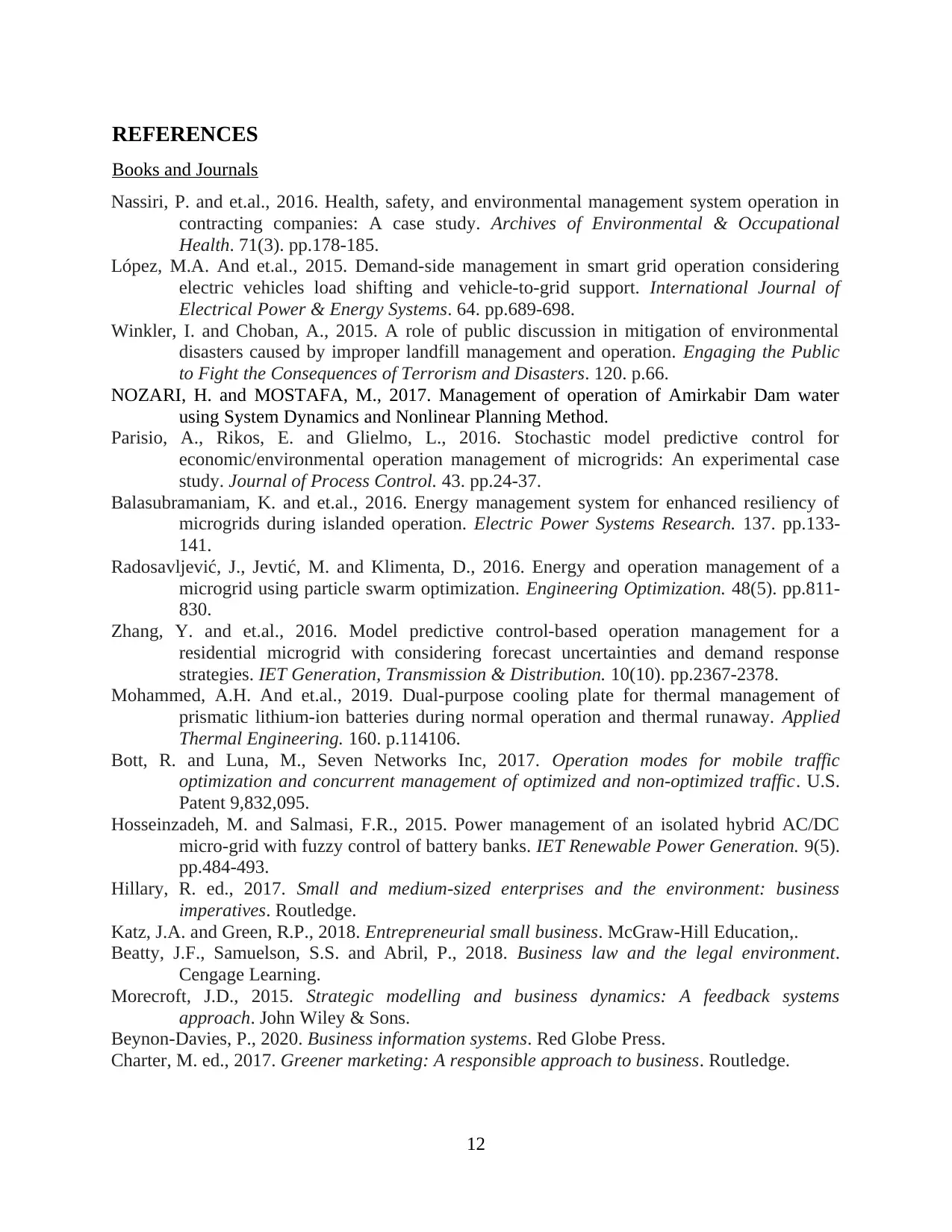
REFERENCES
Books and Journals
Nassiri, P. and et.al., 2016. Health, safety, and environmental management system operation in
contracting companies: A case study. Archives of Environmental & Occupational
Health. 71(3). pp.178-185.
López, M.A. And et.al., 2015. Demand-side management in smart grid operation considering
electric vehicles load shifting and vehicle-to-grid support. International Journal of
Electrical Power & Energy Systems. 64. pp.689-698.
Winkler, I. and Choban, A., 2015. A role of public discussion in mitigation of environmental
disasters caused by improper landfill management and operation. Engaging the Public
to Fight the Consequences of Terrorism and Disasters. 120. p.66.
NOZARI, H. and MOSTAFA, M., 2017. Management of operation of Amirkabir Dam water
using System Dynamics and Nonlinear Planning Method.
Parisio, A., Rikos, E. and Glielmo, L., 2016. Stochastic model predictive control for
economic/environmental operation management of microgrids: An experimental case
study. Journal of Process Control. 43. pp.24-37.
Balasubramaniam, K. and et.al., 2016. Energy management system for enhanced resiliency of
microgrids during islanded operation. Electric Power Systems Research. 137. pp.133-
141.
Radosavljević, J., Jevtić, M. and Klimenta, D., 2016. Energy and operation management of a
microgrid using particle swarm optimization. Engineering Optimization. 48(5). pp.811-
830.
Zhang, Y. and et.al., 2016. Model predictive control-based operation management for a
residential microgrid with considering forecast uncertainties and demand response
strategies. IET Generation, Transmission & Distribution. 10(10). pp.2367-2378.
Mohammed, A.H. And et.al., 2019. Dual-purpose cooling plate for thermal management of
prismatic lithium-ion batteries during normal operation and thermal runaway. Applied
Thermal Engineering. 160. p.114106.
Bott, R. and Luna, M., Seven Networks Inc, 2017. Operation modes for mobile traffic
optimization and concurrent management of optimized and non-optimized traffic. U.S.
Patent 9,832,095.
Hosseinzadeh, M. and Salmasi, F.R., 2015. Power management of an isolated hybrid AC/DC
micro-grid with fuzzy control of battery banks. IET Renewable Power Generation. 9(5).
pp.484-493.
Hillary, R. ed., 2017. Small and medium-sized enterprises and the environment: business
imperatives. Routledge.
Katz, J.A. and Green, R.P., 2018. Entrepreneurial small business. McGraw-Hill Education,.
Beatty, J.F., Samuelson, S.S. and Abril, P., 2018. Business law and the legal environment.
Cengage Learning.
Morecroft, J.D., 2015. Strategic modelling and business dynamics: A feedback systems
approach. John Wiley & Sons.
Beynon-Davies, P., 2020. Business information systems. Red Globe Press.
Charter, M. ed., 2017. Greener marketing: A responsible approach to business. Routledge.
12
Books and Journals
Nassiri, P. and et.al., 2016. Health, safety, and environmental management system operation in
contracting companies: A case study. Archives of Environmental & Occupational
Health. 71(3). pp.178-185.
López, M.A. And et.al., 2015. Demand-side management in smart grid operation considering
electric vehicles load shifting and vehicle-to-grid support. International Journal of
Electrical Power & Energy Systems. 64. pp.689-698.
Winkler, I. and Choban, A., 2015. A role of public discussion in mitigation of environmental
disasters caused by improper landfill management and operation. Engaging the Public
to Fight the Consequences of Terrorism and Disasters. 120. p.66.
NOZARI, H. and MOSTAFA, M., 2017. Management of operation of Amirkabir Dam water
using System Dynamics and Nonlinear Planning Method.
Parisio, A., Rikos, E. and Glielmo, L., 2016. Stochastic model predictive control for
economic/environmental operation management of microgrids: An experimental case
study. Journal of Process Control. 43. pp.24-37.
Balasubramaniam, K. and et.al., 2016. Energy management system for enhanced resiliency of
microgrids during islanded operation. Electric Power Systems Research. 137. pp.133-
141.
Radosavljević, J., Jevtić, M. and Klimenta, D., 2016. Energy and operation management of a
microgrid using particle swarm optimization. Engineering Optimization. 48(5). pp.811-
830.
Zhang, Y. and et.al., 2016. Model predictive control-based operation management for a
residential microgrid with considering forecast uncertainties and demand response
strategies. IET Generation, Transmission & Distribution. 10(10). pp.2367-2378.
Mohammed, A.H. And et.al., 2019. Dual-purpose cooling plate for thermal management of
prismatic lithium-ion batteries during normal operation and thermal runaway. Applied
Thermal Engineering. 160. p.114106.
Bott, R. and Luna, M., Seven Networks Inc, 2017. Operation modes for mobile traffic
optimization and concurrent management of optimized and non-optimized traffic. U.S.
Patent 9,832,095.
Hosseinzadeh, M. and Salmasi, F.R., 2015. Power management of an isolated hybrid AC/DC
micro-grid with fuzzy control of battery banks. IET Renewable Power Generation. 9(5).
pp.484-493.
Hillary, R. ed., 2017. Small and medium-sized enterprises and the environment: business
imperatives. Routledge.
Katz, J.A. and Green, R.P., 2018. Entrepreneurial small business. McGraw-Hill Education,.
Beatty, J.F., Samuelson, S.S. and Abril, P., 2018. Business law and the legal environment.
Cengage Learning.
Morecroft, J.D., 2015. Strategic modelling and business dynamics: A feedback systems
approach. John Wiley & Sons.
Beynon-Davies, P., 2020. Business information systems. Red Globe Press.
Charter, M. ed., 2017. Greener marketing: A responsible approach to business. Routledge.
12
⊘ This is a preview!⊘
Do you want full access?
Subscribe today to unlock all pages.

Trusted by 1+ million students worldwide
1 out of 12
Related Documents
Your All-in-One AI-Powered Toolkit for Academic Success.
+13062052269
info@desklib.com
Available 24*7 on WhatsApp / Email
![[object Object]](/_next/static/media/star-bottom.7253800d.svg)
Unlock your academic potential
Copyright © 2020–2026 A2Z Services. All Rights Reserved. Developed and managed by ZUCOL.





